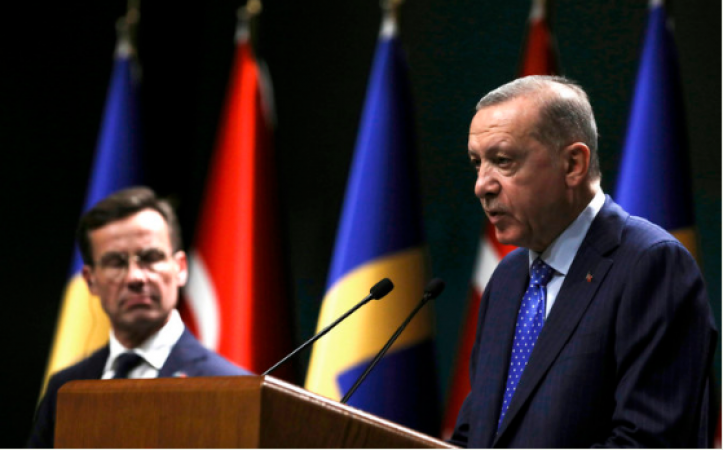
Vinius: On Monday, the prime minister of Sweden will meet with Recep Tayyip Erdogan of Turkey in a last-ditch effort to resolve a diplomatic impasse regarding his Nordic country's stalled NATO membership drive.
NATO is eager to show its unity in the face of Russia's war on Ukraine, which has prompted the high-stakes negotiations the day before an alliance summit in the Lithuanian capital Vilnius.
NATO and the White House both worry that the Kremlin is attempting to sow discord among Western allies by leveraging its close ties to Turkey.
When he meets Erdogan on the sidelines of the two-day event, US President Joe Biden is anticipated to bring up the matter.
Also Read: How to Use a QR Code to Transfer WhatsApp Chat History on Android or iOS
Erdogan has expressed his dissatisfaction with Sweden's alleged failure to uphold its promise to deal with suspected Kurdish militants who are allegedly "roaming the streets" of Stockholm on numerous occasions.
The Turkish president told Biden in a call on Sunday that "Sweden has taken some steps in the right direction," according to a statement from Erdogan's office.
However, Erdogan claimed that Sweden's decision to permit pro-Kurdish organisations to "hold demonstrations freely praising terrorism nullify those steps."
Also Read: Red Sea Global adds 750k solar panels as a major step forward for the drive towards renewable energy
Viktor Orban, the Kremlin-friendly prime minister of Hungary, is in favour of Erdogan's stance.
The two nations are still the sole NATO members preventing Sweden from receiving the required majority vote to join the US-led alliance as its 32nd member.
Hungary has made it clear that, should Turkey approve Sweden's membership, it will do the same as Erdogan and do the same.
Erdogan and Swedish Prime Minister Ulf Kristersson met on Monday; NATO Secretary General Jens Stoltenberg hopes to gain a Turkish commitment of support from the meeting.
After a bitterly contested election in May, which Erdogan won by highlighting his nationalist credentials to his conservative base, analysts had hoped that Erdogan would soften his stance.
The disagreement is the result of an agreement Turkiye made with Sweden and Finland after the neighbours ended their long-standing military non-alignment and sought refuge under NATO's nuclear umbrella in response to Russia's invasion of Ukraine.
Sweden and Finland are obligated by a deal Stoltenberg negotiated at the NATO summit last year to toughen anti-terrorism laws and turn over suspected militants to Turkey.
Erdogan had much less beef with Helsinki, which was formally admitted to the alliance on April 4.
Since Erdogan's 2019 unilateral incursion into northern Syria, Sweden has changed its laws and lifted an arms embargo it had imposed on Turkey.
A man convicted of drug trafficking who had aided the pro-Kurdish PKK militia was also extradited by Sweden last month; this was a first, which Stoltenberg highlighted in remarks last week.
Also Read: Saudi Arabia and France agree to cooperate in the energy sector
Erdogan, however, has seized on Swedish police decisions to permit pro-PKK rallies and protests where anti-Islamic figures have set fire to Qur'anic pages.
Late last month, one of these demonstrations sparked outrage across the Muslim world.
The "Islamophobic" act has received official condemnation from the Swedish government.
It did, however, emphasise that Sweden had a "constitutionally protected right to freedom of assembly, expression, and demonstration."
Erdogan made it clear that he was still open to being convinced and that he had not yet made up his mind.
Turkiye promised on Thursday that he would "make the best decision (on Sweden's membership), whatever it is."